
Thomas Michael Keneally, AO is an Australian novelist, playwright, essayist, and actor. He is best known for his non-fiction novel Schindler's Ark, the story of Oskar Schindler's rescue of Jews during the Holocaust, which won the Booker Prize in 1982. The book would later be adapted into Steven Spielberg's 1993 film Schindler's List, which won seven Academy Awards, including Best Picture.
The Miles Franklin Literary Award is an annual literary prize awarded to "a novel which is of the highest literary merit and presents Australian life in any of its phases". The award was set up according to the will of Miles Franklin (1879–1954), who is best known for writing the Australian classic My Brilliant Career (1901). She bequeathed her estate to fund this award. As of 2016, the award is valued at A$60,000.

Australian literature is the written or literary work produced in the area or by the people of the Commonwealth of Australia and its preceding colonies. During its early Western history, Australia was a collection of British colonies; as such, its recognised literary tradition begins with and is linked to the broader tradition of English literature. However, the narrative art of Australian writers has, since 1788, introduced the character of a new continent into literature—exploring such themes as Aboriginality, mateship, egalitarianism, democracy, national identity, migration, Australia's unique location and geography, the complexities of urban living, and "the beauty and the terror" of life in the Australian bush.
Major Robert Ross was the officer in charge of the First Fleet garrison of marines, and Lieutenant-Governor of the convict settlement of Norfolk Island.
The history of Australia from 1788 to 1850 covers the early British colonial period of Australia's history. This started with the arrival in 1788 of the First Fleet of British ships at Port Jackson on the lands of the Eora, and the establishment of the penal colony of New South Wales as part of the British Empire. It further covers the European scientific exploration of the continent and the establishment of the other Australian colonies that make up the modern states of Australia.
Mary Bryant was a Cornish convict sent to Australia. She became one of the first successful escapees from the fledgling Australian penal colony.
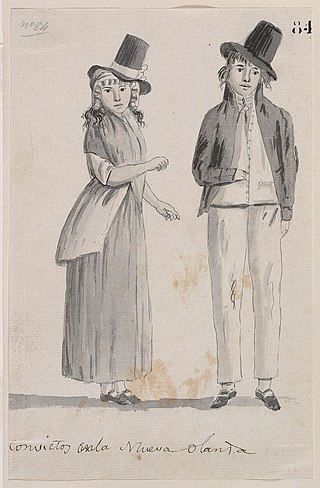
Between 1788 and 1868, about 162,000 convicts were transported from Great Britain and Ireland to various penal colonies in Australia.

The Recruiting Officer is a 1706 play by the Irish writer George Farquhar, which follows the social and sexual exploits of two officers, the womanising Plume and the cowardly Brazen, in the town of Shrewsbury to recruit soldiers. The characters of the play are generally stock, in keeping with the genre of Restoration comedy.
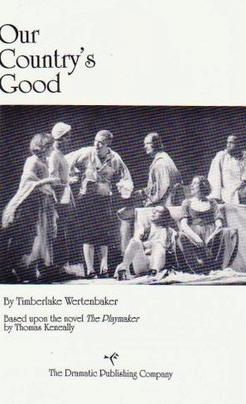
Our Country's Good is a 1988 play written by British playwright Timberlake Wertenbaker, adapted from the Thomas Keneally novel The Playmaker. The story concerns a group of Royal Marines and convicts in a penal colony in New South Wales, in the 1780s, who put on a production of The Recruiting Officer.
Maxwell Robert Guthrie Stewart "Max" Stafford-Clark is a British theatre director.

Bring Larks and Heroes is a 1967 novel by Australian author Thomas Keneally which won the Miles Franklin Award in 1967.

Gossip from the Forest is a 1975 novel by the Australian author Thomas Keneally which deals with the negotiations surrounding the ending of World War I.
The Bathurst rebellion of 1830 was an outbreak of bushranging near Bathurst in the British penal colony of New South Wales.
This article presents a list of the historical events and publications of Australian literature during 2003.
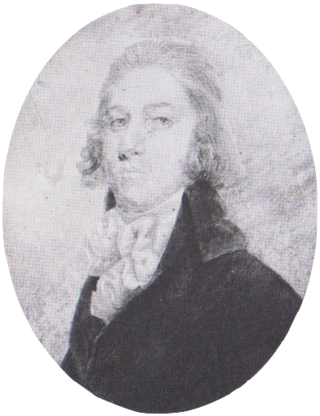
Lieutenant Ralph Clark was a British officer in the Royal Marines, best known for his diary spanning the early years of British settlement in Australia, including the voyage of the First Fleet.

The Australian was an English language newspaper published in Sydney, Australia.

"The Recruiting Officer" is a 1965 Australian television production based on the famous play The Recruiting Officer, which was the first play ever performed in Australia. "The Recruiting Officer" aired on 6 January 1965 in Sydney, 13 January 1965 in Brisbane, and on 20 January 1965 in Melbourne.
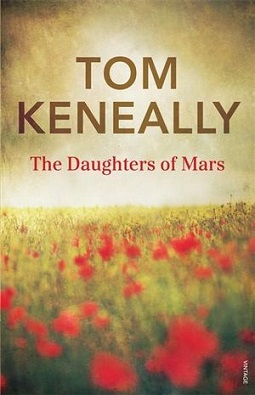
The Daughters of Mars is a 2012 novel by Australian novelist Tom Keneally.
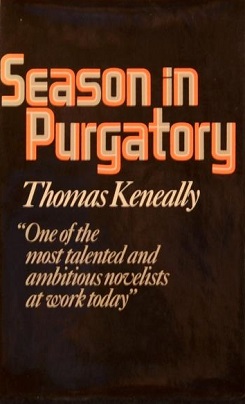
Season in Purgatory (1976) is a novel by Australian author Thomas Keneally.
This article presents a list of the historical events and publications of Australian literature during 1987.












